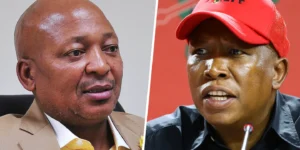By: Clyde N.S Ramalaine
In the ever-vacillating landscape of South African politics, the ongoing crisis at the Cross-Border Road Transport Agency (C-BRTA) has unveiled a saga of leadership discrepancies, questionable academic credentials, and the complex web of political influence. For readers less acquainted with the subtlety of South African political dynamics, it’s imperative to understand the significance of the African National Congress (ANC) and its practices such as cadre deployment, a system where party members are strategically placed in key positions. This context sets the stage for comprehending the implications of the crisis at C-BRTA.
As we engage the intricacies of this unfolding narrative, it’s crucial to pre-emptively address potential counterarguments. While cadre deployment is a common strategy across political landscapes globally, skeptics may argue that other parties engage in similar practices. However, a fastidious examination reveals that the ANC’s approach appears more focused on rewarding political loyalty within the party than on deploying the best talent to address the nation’s pressing needs. By acknowledging and refuting such counterarguments, we fortify the persuasiveness of our critique and ensure a comprehensive understanding of the challenges faced by the C-BRTA.
In the late 20th century, the need for a streamlined and efficient system for cross-border road transport in the Southern African Development Community (SADC) region became increasingly apparent. Recognizing the significance of facilitating the movement of commuters and freight operators across national borders, the Cross-Border Road Transport Agency (C-BRTA) emerged as a pivotal entity, conceived through the legislative framework of Act 4 of 1998.
This article aims to explore the objectives and establishment of the C-BRTA, its role in regulating cross-border road transport, and the challenges it faces in leadership and governance. The central focus is on the appointment of CEO Lwazi Mboyi, his questionable academic qualifications, the negligence of the C-BRTA board, and the inaction of the Public Service Commission (PSC), intertwined with the broader issue of cadre deployment
Enacted by the parliament, Act 4 of 1998 outlined the establishment of the C-BRTA with a clear mandate to address the challenges hindering the cross-border flow of road transport. The primary goal was to alleviate mobility constraints faced by road transport operators while fostering sustainable social and economic development within the SADC region.
Functioning as an interstate operations agency, the C-BRTA took on the responsibilities of regulating market access and issuing cross-border permits. By doing so, it aimed to introduce regulated competition, ensuring a fair and efficient system for all stakeholders involved in cross-border road transport.
For over two decades, the C-BRTA has proudly served as the driving force behind the region’s cross-border business focus. Its establishment marked a significant step towards improving the unimpeded flow of freight and passengers across national boundaries. The agency’s role encompasses providing advice, regulation, facilitation, and law enforcement to create a cooperative and coordinated approach in managing cross-border road transport.
The Cross-Border Road Transport Act 4 of 1998 articulated the intentions behind the agency’s establishment. It sought to promote cooperation and coordination among the public and private sectors involved in cross-border road transport. Additionally, the act aimed to repeal certain outdated laws, making way for a more contemporary and effective regulatory framework.
In summary, the C-BRTA, born out of Act 4 of 1998, stands as a testament to the commitment of the SADC region towards enhancing the efficiency and sustainability of cross-border road transport. With its multifaceted approach encompassing advice, regulation, facilitation, and law enforcement, the agency continues to play a crucial role in shaping the landscape of regional transportation for the benefit of all stakeholders involved. Ordinarily entities of this a nature be they private or public sector based need seasoned and tested leadership better understood in an executive team.
The Appointment of CEO Lwazi Mboyi
On May 25, 2022, the then Minister of Transport, Fikile Mbalula, in the sunset of his tenure as Minister of Transport, readying to campaign for the powerful Secretary-General position of the ANC, in his official capacity, appointed Mr. Lwazi Mboyi to the position of CEO of the Cross-Border Road Transport Agency (C-BRTA).
CEO of C-BRTA Mr. Lwasi Mboyi
Typically extending over five-year periods, these appointments bear significant responsibilities, as indicated in the appointment letter, which outlined Mr. Mboyi’s accountability to the Board for the day-to-day and overall management of the C-BRTA. A cursory examination of Mr. Mboyi’s C-BRTA profile reveals his prior role as CEO, albeit in acting capacity, before the official appointment, accompanied by academic qualifications, including a B. Admin (Public Finance), Honours in Industrial Psychology from the University of KZN, Senior Executive Program (WITS & Harvard Business School), Africa Directors Program (USB and INSEAD), and an MPHIL in Development Finance with an outstanding dissertation.
However, discrepancies arise concerning the educational qualifications required for the CEO position. Originally, when the position was first advertised, the equivalent roles and job descriptions mandated a completed Masters as a minimum qualification. At the time of Mr. Mboyi’s appointment, he claimed to possess an MPHIL, bracketed with an outstanding dissertation. The ambiguity surrounding the significance of “Senior Executive Program (Wits & Harvard)” and “Africa Director Program (USB and INSEAD)” raises questions about their relevance and equivalency in qualifications, adding to the uncertainty.
These discrepancies prompted inquiries by senior managers and Agency staff, with more than 60 months of employment on average, leading to a cohort of senior managers raising concerns with the Board and the Public Service Commission (PSC). The issue surrounding the intermittent Masters qualification, particularly the MPHIL, raised discomfort among the staff, with accusations of unethical behavior on the part of the CEO, jeopardizing the institution’s credibility.
In response to these concerns, the CEO took a tyrannical approach, instituting insubordination charges that resulted in the suspension and subsequent firing of managers, including nine senior managers. The ambiguous nature of Mr. Mboyi’s claimed educational qualifications became the focal point of ongoing challenges at the Agency, casting doubt on the institution’s leadership and trustworthiness.
It is important to note that at the time of the appointment of Mr Mboyi, he had already acted for the calendar and financial years 2020 and 2021 as CEO of the agency. It thus appears almost normal for Mr Mboyi to eventually be appointed as the letter of his appointment dated May 2022 with an acknowledged start date of April 1, 2022 attests. The challenge however is that Mr Mboyi’s education profile for the periods 2020 to 2021 to eventually 2022 oscillates in difference of detail as it relates to his claimed masters qualification. In 2020 as per the Annual Report, which is a public record of the State Agency, Mboyi’s holds a full Master’s Degree, the details of this qualification was augmented for the 2021 Annual Report, which now had the MPHIL with brackets of (Dissertation outstanding). At the time of his appointment in 2022 Mboyi’s fickle MPHIL qualification disappeared all-together.
The fluctuating claims regarding Mr. Mboyi’s academic qualifications, specifically the assertion of possessing an MPHIL in 2020, clarification of the qualification with an outstanding dissertation in 2021, and its complete removal in 2022, prompted scrutiny from senior managers and longstanding employees at the Agency, each with an average tenure exceeding 60 months. This group of seasoned professionals, in pursuit of transparency, formally addressed their concerns through a comprehensive list of complaints submitted to both the C-BRTA Board and the Public Service Commission (PSC). Those individuals who raised objections about the CEO’s intermittent presentation of his Master’s qualifications, notably the MPHIL, expressed discomfort at the CEO’s apparent pressure to repeatedly alter his educational credentials, deeming such actions as bordering on unethical behaviour.
A second layer of challenges confronting the CEO pertain to the documented occurrence that, a mere four months into his tenure in August 2022, Mr. Mboyi, with an initial package of R3.2million, unilaterally awarded himself a substantial increase of R1million. This action, deemed impermissible and improper according to the governing legislation Act for the Agency, remarkably went uncontested by the C-BRTA Board and encountered no opposition, questions of clarity from the Public Service Commission, a pivotal institution overseeing such matters were hardly responded to.
Mr Mboyi, authorising his own salary package increment by approximately 30%, not only transgressed the regulations during what could easily be considered his probationary period – a contravention of the Agency’s operational legal framework- but also by an excessive margin surpassed the benchmark for salary increments afforded and prescribed to civil servants during the same period. This unilateral salary adjustment poses multifaceted challenges, not only in terms of legal compliance but also in its implications for the organisation’s financial standing and the public perception of responsible and accountable governance stewardship within a public sector entity.
C-BRTA Board – Negligence in Oversight and Fiduciary Roles, Failing to Vet CEO’s Qualifications and Addressing Tyrannical Behaviour
The process of vetting credentials, education, and resumes of applicants is an expected standard practice in both private and public entities. This meticulous examination is essential for ensuring that individuals appointed to key positions possess the qualifications and experience necessary to fulfill their roles effectively. Scholars like Peter Cappelli, a management professor at the Wharton School, emphasize the importance of thorough vetting to avoid costly hiring mistakes and to maintain the credibility of an organization (Cappelli, 2015).
One notable example of the failure to vet a CEO’s academic qualifications is highlighted in the case of Mr. Lwazi Mboyi at the Cross-Border Road Transport Agency (C-BRTA). The board’s omission in scrutinizing Mr. Mboyi’s educational background led to discrepancies in his claimed qualifications, resulting in a credibility crisis for the institution. Such lapses can have severe ramifications, damaging the organization’s reputation and trustworthiness. In the case of C-BRTA, the failure to conduct due diligence on Mr. Mboyi’s academic credentials not only reflects poorly on the board’s competence but also raises questions about its commitment to responsible leadership.
Given the lack of verification of Mr. Mboyi’s claimed education credentials, questions may arise regarding the legitimacy of his B Admin (Public Finance) and Honours in Industrial Psychology qualifications. The Board’s lack of oversight not only opens the door to skepticism about the mentioned junior qualifications but also raises queries about the accuracy of CEO Mboyi’s public C-BRTA profile. Furthermore, clarity is needed on the significance of the Senior Program courses from Wits and Harvard, as well as the African Leaders Program from Stellenbosch University in collaboration with INSEAD, with the latter possibly being perceived as a reactive measure to address concerns about unethical claims of an MPHIL degree raised by senior managers at C-BRTA.
We must acknowledge the two tenures of the former CEO, Sipho G Khumalo, who, despite facing legal challenges in 2022, currently serves as an advisor to the current Minister Sindisiwe Chikunga in the transportation sector. In 2022, the C-BRTA boards and CEO Lwazi Mboyi sought a declaration of delinquency against Khumalo in the Pretoria High Court. However, the court dismissed the application in January 2023, with costs. It is noteworthy that during Khumalo’s leadership, he successfully transformed the Agency, leaving it in a financially healthy state with a positive bank balance in May 2010. His tenure resulted in numerous clean audits, a bank balance, and a revenue turnover exceeding R300 million. Despite these achievements, Khumalo has faced criticism from detractors and the current Board, which granted Mboyi an open cheque exceeding R10 million to address labor cases involving individuals perceived as Khumalo’s appointees.
Chairperson of the C-BRTA Board. Advocate Sonwabile Mancotywa
In another aspect, shedding light on the subject of the C-BRTA Board’s stewardship, or lack thereof, necessitates an inquiry to elucidate the circumstances under its leadership that led to the C-BRTA’s excesses in legal expenditures and executive remuneration. An illustrative example of this lapse in due stewardship and discrepancies becomes apparent during Mbalula’s tenure as minister, particularly in the 2021/22 financial year. During this period, the CEO (Mboyi), supported by the board, facilitated the reimbursement of all EXCO members, contravening a 2020 Cabinet resolution stipulating that, during the COVID- 19 pandemic lockdown, no senior official in the government was permitted to receive salary increases or bonuses. Despite Mbalula’s participation in the Cabinet meeting, he allowed the C-BRTA Board to permit the CEO and other executives to receive paybacks, ostensibly attributed to COVID restrictions.
Furthermore, the C-BRTA Board must be held accountable for its inconsistency in manifestly pursuing only certain interests of the entity, particularly in relation to specific individuals such as its appetite to go after former CEO Khumalo while having no appetite to engage the current CEO. This underscores the importance of consistency, especially in cases where the Board demonstrates a conspicuous lack of interest in addressing concerns regarding Mboyi’s appointment, qualifications, and a significant salary increase within the initial five months of his tenure. This inconsistency becomes particularly salient given the Board’s active pursuit to declare Mboyi’s predecessor a delinquent director. Queries directed towards Mboyi should be meticulously examined, emphasizing the Board’s central role in the matter and dispelling any presumption of innocence, especially concerning expenses incurred by senior managers.
Furthermore, the C-BRTA Board must answer how and why the item LEGAL budgeted for in the particular year, detailed as R3m, and never previously exceeded, could have registered gross over-expenditure in excess of R10m, amounting to R13million or otherwise over 350%. Ordinarily, legal budgets in entities such as C-BRTA are allocated based on the principle of periodically soliciting legal opinion if and when needed. Historically, in the existence of the C-BRTA, its LEGAL budgets have never been exceeded. The reasons for such lie in the nature and type of entity the C-BRTA constitutes, as it is a legal authority in itself and is duly resourced with the necessary legal infrastructure and personnel as an in-house function. Furthermore, budgets on an annual basis are adjusted by the inflation percentage base. A scrutiny of the C-BRTA’s expenditure since 2010 confirms that legal fees have rarely ever been exhausted in any particular year. The challenge for the Board thus lies in the lack of oversight and its fiduciary role negligence, allowing for such expenditure.
On another note, a closer examination of the actual LEGAL expenditure details reveals costs incurred with labour cases and disputes as a central item, bringing us back to the subject of disciplinary hearings of senior managers who expressed reservations about the ever-changing tertiary qualifications of the CEO, Lwasi Mboyi. The legal fees are thus for cases that the C-BRTA lost in every instance in a court of law.
The Board and its EXCO furthermore warrant an explanation on why, for the first time in the 25-year history of the C-BRTA’s existence, an Annual Report for 2023/24 is absent of figures of account. Is this possibly to veil the legal costs as exposed by the news agency, City Press? It could be alleged that the Board and EXCO thus misled auditors to claim legal fees were R5 million in the 2022/23 financial year by simply moving some legal costs to consultant fees. It is noteworthy that both legal and consultant costs exceed ten million rands.
Mbalula’s Trusted Lieutenants Shape the C-BRTA in Chairperson and CEO Designations.
Moreover, the composition of the board itself may warrant examination. If the board is perceived to be unduly influenced or constituted with individuals aligned with the appointing authority, in this case, the then Minister of Transport, Fikile Mbalula – who since have reached the most powerful position and office of Secretary General of the ANC, questions of impartiality and independence arise. The failure to conduct a rigorous vetting process could be indicative of potential conflicts of interest or a lack of autonomy within the board.

Former Minister of Transport Mr. Fikile Mbalula
This interlinked network of individuals, referred to colloquially as the ‘crew,’ has been implicated in controversial events, such as the USA pop star Beyonce no-show concert during Mbalula’s Arts Sport and Culture ministerial term, which incurred substantial costs for South Africans. The recurrent presence of Mbalula’s trusted associates in various positions, spanning from Sports to Police and ultimately to the Transport sector, raises concerns about the impartiality of their appointments and could potentially explain the wilful oversight or neglect in conducting standard due diligence to verify and scrutinize Mr. Mboyi’s qualifications. This situation reflects a precarious intersection of political affiliations, cadre deployment practices within the ANC, and the potential implications for responsible leadership and governance within public entities.
The absence of proper vetting of Mr. Mboyi’s credentials by the C-BRTA board represents a failure in due diligence and responsible leadership. Thorough scrutiny of qualifications is a standard practice to ensure the credibility of appointments, and deviations from this practice can lead to significant repercussions for the organization’s integrity. As organizations strive for transparency and accountability, the importance of robust vetting processes cannot be overstated, especially when appointing leaders to key positions. The subject matter of a cricis at the C-BRTA and then Minister Mbalula’s fingerprints in control, influence and known associations with top leadership as well as the CEO’s qualifications was engaged in Parlaiment through a set of questions raised by the Economic Freedom Fighters (EFF) Party representatives.
The EFF Questioned Minister Mbalula on the C-BRTA CEO’s qualifications, security clearance levels and the operations.
The Economic Freedom Front (EFF) in October 2022, during a parliamentary session, raised a set of pertinent issues with the then Minister of Transport, Fikile Mbalula, regarding the C-BRTA, its CEO, and Board Members.
The EFF posed critical questions to the Minister of Transport are herewith contained:
- On what date is it envisaged that he will fill the vacant position of the board chairperson in line with the composition requirements of the Cross-Border Road Transport Act, Act 4 of 1998, considering the current Board has been operating for over one (1) year, and its decisions may attract litigation risk for the agency?
- Can the Minister explain his relations between himself and the CEO (Mr Lwazi Mboyi) and the Acting Chairperson of the Board of Directors (Ms Lerato Molebatsi)?
- Is the Minister in a position to confirm if Mr Mboyi was his deployee at the NYDA while the Minister was the then Minister of Sports, Arts and Culture? Also, if the same Mr Mboyi was the individual who was responsible for paying an American superstar, Beyonce, R500k for a no show during the Youth Event?
- Can the C-BRTA Board of Directors inform us why did the post of the CEO level or qualifications requirements be lowered from a relevant Transport Masters Degree in 2021 to that of an Honours? Was it to accommodate the current incumbent?
- Can the Board please inform what Personnel Management (HR) processes, vetting, and qualifications check were followed in appointing the CEO, the HR Executive Dr Tsako, the Regulatory Executive Dr Mbana and renewal of all other Executives and Senior Managers contracts?
- The Minister and the C-BRTA Board as well as the CEO are requested to confirm which academic qualifications does the CEO possess, when were these qualifications completed and at which Tertiary Institution(s)?
- Is the Board in a position to inform us, what Executive or Senior Management positions has the appointed CEO ever occupied before being appointed CEO of the C-BRTA in April 2022?
- What is the total amount in Rands has the Cross Border Road Transport Agency spent on International travel since 1 April 2022 when the current CEO was appointed? This amount should include costs for S&T, Land and Air Travel, Hotel Accommodation, Entertainment or Meals and for what purpose was each trip?
- What total number of executive positions at the Cross Border Road Transport Agency including gender and ethnicity breakdown?
- What is the total number of employees on suspension at the Cross Border Road Transport Agency, what are their job levels, how long has each employee been on suspension, and those who have been cleared by internal Disciplinary Processes why are they still earning public monies while at home? Furthermore, what is the amount the agency has spent on salaries of the specified employees since their suspension(s)?
- What total amount has the Cross Border Road Transport Agency spent on legal fees for the disciplinary hearings in the current financial year?
- Can the C-BRTA Board, indicate what is the security clearance level of the CEO and EXCO members of the C-BRTA? Who conducted the security clearance(s), and if they are in accordance with the policies of the Agency?
- In conclusion, can we be informed why during the recruitment of the CEO and appointment thereof, there was no single HR personnel or official in the process to test the qualifications and run a common clearance of the CEO, which includes checking and verifying his qualifications?
The City Press investigation led it to conclude that some of the answers as raised by the EFF presented in parliament by then Minister Fikile Mbalula were simply not truthful, deducing Parliament may have been misled. These questions, which Minister Mbalula at the time in 2022 never fully answered, remain central to the contention of an unhealthy influence that Mbalula had over the C-BRTA and its leadership. In conclusion, the implications of a minister lying or misleading Parliament underscore the need for accountability and transparency in governance.
The EFF questions encompass diverse dimensions. Firstly, concerns about the timing and process of appointing a new board chairperson underscore potential legal risks associated with decisions taken by the existing board, operating beyond its stipulated tenure. The inquiry into relationships between Minister Mbalula and the CEO and Acting Chairperson sheds light on potential political affiliations influencing appointments. Additionally, queries regarding the CEO’s history of employment and the alteration of qualification requirements suggest possible improprieties in the appointment process.
Furthermore, the EFF’s questions extend to the HR practices followed in appointing key executives, emphasizing the need for transparent and merit-based recruitment. The investigation into the CEO’s academic qualifications, executive positions held previously, and the adjustment of qualification requirements over time adds another layer of scrutiny to the credibility of leadership within the C-BRTA.
Furthermore financial transparency is brought into focus through inquiries on international travel expenditures and legal fees related to disciplinary proceedings. Such financial details are vital for assessing the agency’s fiscal responsibility and stewardship of public funds.
Also, questions related to the security clearance of the CEO and executive members emphasize the importance of adherence to agency policies, ensuring a secure and trustworthy leadership structure. The culmination of these inquiries points to the need for comprehensive answers to establish the integrity of C-BRTA’s leadership and assess the credibility of Minister Mbalula’s responses to Parliament. The CityPress investigation suggesting potential untruthful responses further amplifies the urgency of obtaining accurate information, underscoring the significance of transparency and accountability in public governance.
Ordinarily in instances where such serious concerns as ventilated by the suspended and fired C-BRTA senior managers, the EFF, and the CityPress news agency arise, the PSC from its unique tailored mandate would have a natural interest.
PSC Inactions Registers Strange Behaviour given its designated role
In the South African legislative context, the Public Service Commission (PSC) holds a critical role as a watchdog entity responsible for overseeing and ensuring adherence to principles of good governance and ethical conduct within the public service. The PSC is guided by Acts such as the Public Service Act of 1994 and the Public Administration Management Act of 2014. The central objectives of the PSC include promoting effective public administration, conducting investigations into matters related to public administration, and ensuring fair employment practices. The PSC, in fulfilling its functions, is expected to act as an impartial arbiter and a guardian of public service integrity.
Moreover, the speculated role of ANC political leadership and cadre deployment in influencing the behaviour of the PSC further underscores the need for scrutiny. If the PSC’s inaction is linked to political considerations rather than an impartial assessment of the claims made by senior managers, it compromises the integrity of the oversight mechanism. The PSC must be reminded of its responsibility to provide a transparent and just governance framework, especially in entities like the C-BRTA, where public trust and effective leadership are paramount. The sustained inaction of the PSC, in this context, raises questions about its relevance and its ability to act as a beneficial entity for the C-BRTA, reinforcing the need for an impartial and rigorous evaluation of its role and effectiveness.
The PSC’s failure to proactively address complaints regarding the C-BRTA CEO’s appointment, without vetted qualifications, subsequent salary increase hardly four months after his appointment, and alleged victimization raises grave concerns about its efficacy as a guardian of public service integrity. This glaring inaction threatens the overall health of the C-BRTA and sets a precedent for potential challenges in maintaining transparency and ethical standards in other public institutions.
News 24, SAMSA, and other transport entities all under Mbalula and the current Minister have reported on the controversial appointment of Lwasi Mboyi by C-BRTA. His substantial R1 million salary increase, just five months into the position, has raised eyebrows as it allegedly occurred without adhering to proper processes.
The recent Constitutional Court ruling mandating the ANC to disclose all records related to cadre deployment, particularly from 2013 onward during President Ramaphosa’s tenure as chairperson of the Deployment Committee, signifies a crucial moment in South African political transparency. The unfolding case has unveiled the ANC’s extensive efforts to shield Ramaphosa from potential implications. On another score the anticipation to access minutes, such as those from the August 28, 2016 meeting, chaired by Ramaphosa and documented by the late DSG Jesse Duarte, held personal significance.
In conclusion, the objectives outlined in Act 4 of 1998 for the establishment of the C-BRTA reflect a commitment to enhancing cross-border road transport efficiency in the SADC region. However, the appointment of CEO Lwazi Mboyi and subsequent challenges reveal a critical failure in due diligence by the C-BRTA board. The recurrent theme of cadre deployment, questionable academic qualifications, and the inaction of the PSC collectively pose a severe threat to the agency’s credibility and overall health.
As organisations strive for transparency and accountability, the importance of robust vetting processes cannot be overstated, especially when appointing leaders to key positions. The sustained inaction of the PSC raises broader concerns about its efficacy as a guardian of public service integrity, affecting not only the C-BRTA but also setting a precedent for potential challenges in maintaining ethical standards in other public institutions.
In a separate context, the role of Fikile Mbalula, representing ANC political leadership and currently holding the position of Secretary General, introduces governance concerns. The potential impact of political affiliations on decision-making within the C-BRTA, especially considering Mbalula’s historical connections to the agency and CEO Mboyi, raises questions about impartiality and the influence of political dynamics on governance practices.
The questionable practice of cadre deployment by the ANC, while prevalent in various political landscapes globally, has had a precarious impact on the objectives of true transformation in South Africa. While cadre deployment is a common political strategy, the ANC’s implementation appears more focused on rewarding political loyalty and connections within the party rather than ensuring the deployment of the best talent to address the nation’s pressing needs, hindering the realization of genuine transformation goals.











